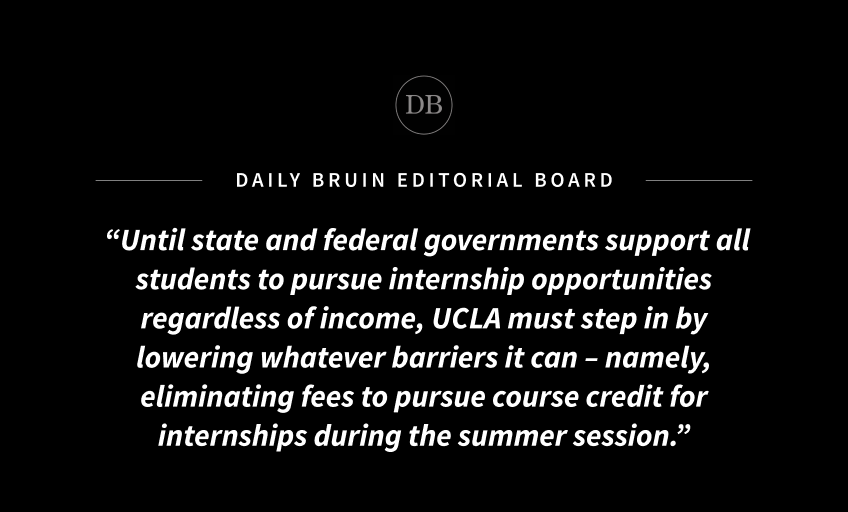Editorial: UCLA must make 195CE summer internship courses free to protect low-income students

By Editorial Board
Sept. 4, 2022 11:27 a.m.
This post was updated Sept. 5 at 6:34 p.m.
Editor’s note: Editorials do not represent the Daily Bruin as a whole. The board encourages readers to respond to our editorials at dailybruin.com/submit.
Charging students to work should never be normal.
Unfortunately, this practice remains alive and well at UCLA.
The university’s Center for Community Engagement offers 195CE internship courses each quarter. These classes require upperclassmen to log at least 80 hours with an off-campus internship program, which can be paid or unpaid, on top of meeting with an advisor and completing regular assignments.
According to California state law, unpaid internships must primarily benefit the intern. In order to satisfy this requirement, the internship must be a component of their formal education. Often, that means interns must receive academic credit to be eligible.
During the normal academic year, there are no additional fees on top of regular tuition for the four units of credit students receive in exchange for successful completion of the program; however, students receiving credit for their internships during the summer can pay upwards of $1,300 in tuition and fees as they do with other academic courses.
If Bruins want an unpaid summer internship in California through the CCE’s courses, they often need to be able to work for free while also paying extra funds to UCLA for 195CE credit.
This state of affairs isn’t just classist but antithetical to UCLA’s stated goal of creating an equitable campus for its diverse student body. Until state and federal governments support all students to pursue internship opportunities regardless of income, UCLA must step in by lowering whatever barriers it can – namely, eliminating fees to pursue course credit for internships during the summer session.
Defenders of this system have justified it by saying that unpaid internships do pay – just in skills and connections rather than monetary compensation.
But these don’t pay bills, tuition included.
During an economic crisis, there is all the more reason to scrutinize these practices and put resources toward addressing the issues they cause.
Recession aside, the unpaid internship ecosystem does undeniable disproportionate harm to marginalized communities. A 2021 survey by the National Association of Colleges and Employers found that they are overrepresented in unpaid internships, underrepresented in paid ones and more likely to not participate in internship programs at all relative to their nonmarginalized counterparts.
If this trend holds true for UCLA students, it certainly stands to reason that marginalized students are also more likely to be required to pay to receive academic credit to be eligible for their internships or not intern at all.
The university needs to understand that having a diverse student body is only the first step. UCLA should never disproportionately restrict vital opportunities for student success.
Our school may not have the power to make internships pay us for our labor, but it can take significant steps to make these unpaid opportunities less burdensome.
Tuition-free internship courses year-round is a critical one.
Notably, there are financial aid opportunities and a handful of scholarships available for students participating in 195CE. These are absolutely necessary, but Bruins shouldn’t have to compete with one another for a half-dozen scholarships. UCLA must ensure that internship and financial aid opportunities are as accessible as possible for all of its students – not just a lucky few.
UCLA can’t fix the root of this problem, and the board doesn’t expect it to.
We do, however, expect our university to stop making it worse.

